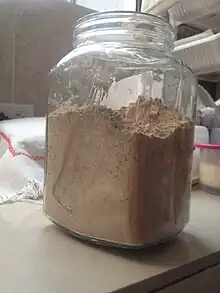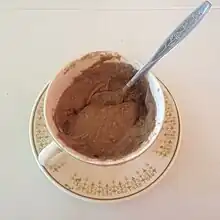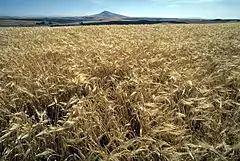Máchica
Máchica (Quechua: machka) is a type of flour made from ground toasted barley or other toasted grains. It is used in Bolivian, Ecuadorian and Peruvian cuisine.

History
Spanish colonists brought the technique of toasting grain to enhance its nutritional value, then grinding the toasted grain into flour, from Central America to the Andean region. The Mesoamerican product, pinole, uses toasted corn, but in Ecuador the process was applied primarily to barley.[1][2]
Production
Grain is toasted, then ground finely.[2]
Uses

Máchica is used in a variety of foods that are part of Andean cuisine. These include chapo, an herbal tea decoction made with lemongrass, lemon verbena or other herbs; another beverage called colada de máchica made by mixing the máchica with hot or cold liquid; nogadas, a nougat confection made using panela (unrefined cane sugar), eggs, máchica and a variety of walnut called toctes; pan de máchica, a variety of bread baked using máchica in addition to untoasted flour; pinol—akin to but distinct from pinole—a beverage prepared in a manner similar to colada de máchica but which also includes ground panela and spices such as anise, cinnamon and cloves; sopa con máchica, any of a variety of savory soups or stews thickened with máchica; and torta de máchica, a cake baked with máchica.[3] Soups to which máchica is added typically have a base of carrots, legumes, onions and potatoes, and may or may not contain meat.[4] It is used to batter and season meat to be fried, such as pork rinds[1] or shellfish including shrimp.[5] Máchica is sometimes also added to hot chocolate[2] or cold juice, and has been used to flavor ice cream.[6] It is incorporated into stroopwafels (a cookie which originated in the Netherlands) made in Peru and filled with other Andean ingredients such as passion fruit and chicha.[7] Some indigenous peoples use máchica to prepare cuy, a traditional meat.[4]
Nutritional value
One hundred grams of máchica made from barley contains 344 calories (kcal), 8.6 grams protein, 0.7 g fat, 77.4 grams carbohydrates, 6.6 g fiber, 74 mg calcium, 320 mg phosphorus, 12.3 mg iron, 0.12 mg vitamin B1, 0.25 mg vitamin B2, 8.7 mg niacin, and 1.9 mg vitamin C.[3] For máchica made from wheat, 100 grams contain 347 calories, 7.9 g protein, 1.2 g fat, 79.9 g carbohydrates, 4.1 g fiber, 67 mg calcium, 0.9 mg iron, and 2.7 mg vitamin C.[8]
Other varieties
In Peru, the product sold as máchica is most often made of toasted corn flour. It is mixed with sugar and cinnamon in a manner similar to both Central American pinole and Ecuadorian pinol.[9] Máchica may also refer to flour made with ground toasted wheat, a variation also found in Peru,[8] as well as in Bolivia, where it is the most common type of máchica.[3]
See also
- Barley flour
- Gofio, a similar product in the Canary Islands, brought to Latin America
References
- Traditional High Andean Cuisine: Allin Mikuy / Sumak Mikuy (PDF) (English ed.). Food and Agriculture Organization of the United Nations (FAO). 2013. pp. 145, 198–200, 217. ISBN 978-92-5-106524-2. Retrieved 15 October 2015.
- "Hot Chocolate With Máchica". Food.com. Adapted from an article in Food & Wine magazine. Retrieved 15 October 2015.
- Herrera Ortega, Alvaro. Propuesta Gastronomica para Incentivar el Consuma de la Máchica de Cebada con Recetas Tradicionales y de Innovación [Gastronomic Proposal to Increase the Consumption of Barley Máchica with Both Traditional and Innovative Recipes] (PDF) (Thesis) (in Spanish). Universidad de Cuenca. pp. 19, 23–40, 43–49. Retrieved 14 October 2015.
- "Los puruháes y su diversidad gastronómica" [The Puruháes and gastronomic diversity]. La Hora (in Spanish). 23 May 2015. Archived from the original on 4 March 2016. Retrieved 15 October 2015.
- "La comida ecuatoriana disputará un partido aparte en Brasil 2014" [Ecuadorian food will play a separate party in Brazil in 2014]. El Comercio (in Spanish). 10 June 2014. Retrieved 15 October 2015.
- "Helados rescatan sabores típicos ecuatorianos" [Ice cream revives typical Ecuadorian flavors]. El Comercio (in Spanish). 12 September 2014. Retrieved 15 October 2015.
- "En Holanda descubrí la receta para mi negocio" [In Holland I found the recipe for my business]. Perú 21 (in Spanish). 6 January 2013. Retrieved 15 October 2015.
- "Composición Nutricional de: Trigo, Harina Tostada de (Machica)" [Nutritional Composition: Wheat, Toasted Flour of (Machica)]. ComposicionNutricional.com (in Spanish). Retrieved 15 October 2015.
- "máchica: definition of máchica in Oxford Dictionary (Spanish)". OxfordDictionaries.com. Retrieved 15 October 2015.
